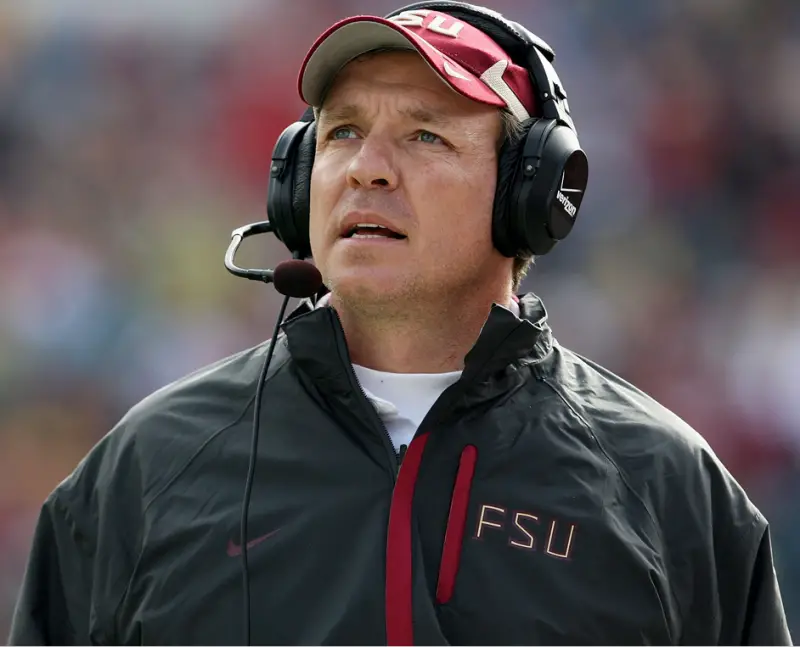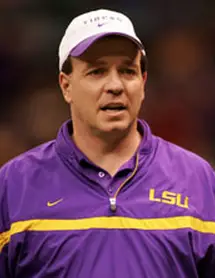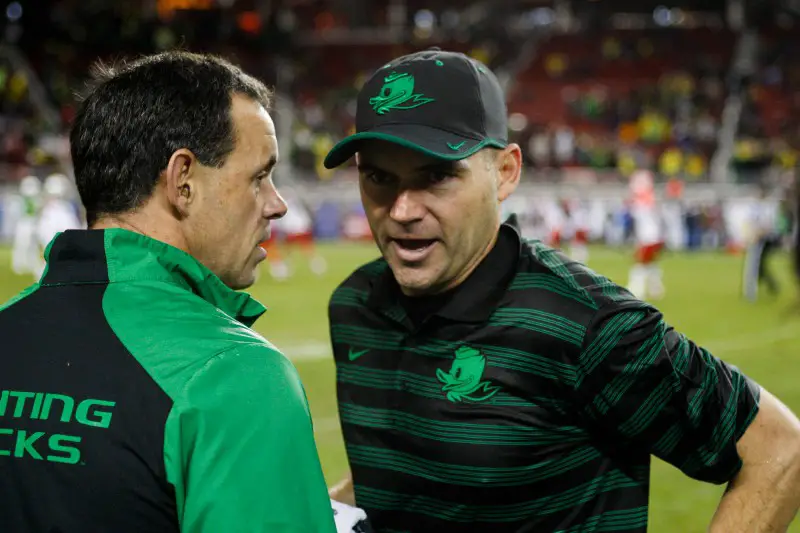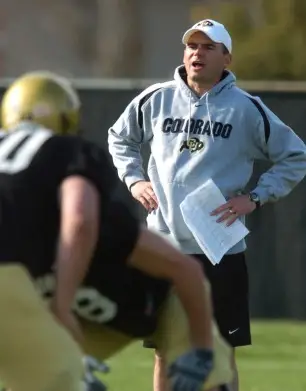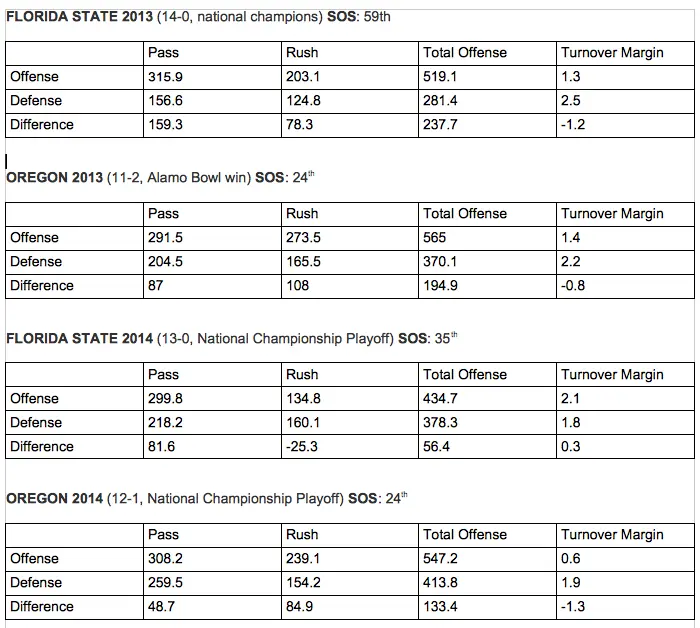Is Oregon Ducks head football coach Mark Helfrich a boy among men? There he sat on Thursday, blinking out at the lights, cameras and a crowd of jaundiced national sports writers at the press conference featuring the four men who’ve led their teams to the brink of the first ever college football playoff championship, looking for all the world like a nice guy who may have wandered up onto the stage by accident.
Helfrich joined three relatively grizzled veterans of this sort of sideshow — Florida State’s Jimbo Fisher, Alabama’s Nick Saban and Ohio State’s Urban Meyer — in the presser held before the College Football Awards Show at Disney’s Boardwalk Hotel Convention Center in Lake Buena Vista, Florida. You know, the awards show where new-to-the-national-spotlight Helfrich’s quiet, unassuming quarterback Marcus Mariota walked away with everything but the kitchen sink and Mickey’s ears (Ifo Ekpre-Olomo had already left for Eugene with those in his carry-on).
Ever the self-deprecator, Helfrich praised his vastly better known peers, saying: “Certainly what these coaches have done in their careers is something we’re shooting for and is incredibly impressive. Coach Fisher, to win 29 games in a row, to stay focused for 29 seconds in this business is really hard for some of our players. And they have done it for 29 games. That’s incredible.”
Yes, it is.
There’s no debate about the fact Saban, Meyer and most recently Fisher have become familiar names across the country with folks who follow college football. Helfrich? I’d guess maybe 10 percent of the fans in Alabama or Florida or Ohio who’ve heard of Mariota and know he plays for the Ducks also know who his coach is.
Well, let’s do something about that. Let’s see if Helfrich really is in over his coaching head. Here’s a quick comparison of him and his coaching adversary in the upcoming Rose Bowl semi-final, Jimbo Fisher.
Fisher
Jimbo Fisher, Jr. was born in Clarksburg, West Virginia, in 1965. While a senior at Homewood, Alabama’s Samford University, Fisher was named the 1987 NCAA Division III national Player of the Year. He played a year in the Arena Football League for the Chicago Bruisters, then began his coaching career as a graduate assistant working with quarterbacks at his alma mater.
After two seasons at Samford, Fisher moved to Auburn, where he again coached quarterbacks, working under Terry Bowden. He remained there until Tommy Tuberville took over as head coach following Bowden’s resignation in the middle of the 1998 season. Fisher then moved to Cincinnati, serving as offensive coordinator for a year there before joining Nick Saban’s new staff at LSU in 2000. Fisher hung around after Saban left for the NFL and the Miami Dolphins, working under new Tigers’ head coach, Les Miles.
After a messy “now you’re hired, now you’re not” snafu with University of Alabama/Birmingham, Fisher turned down an invite from Saban to join the staff at ‘Bama and instead left LSU to become offensive coordinator and quarterbacks coach at Florida State, replacing the legendary Bobby Bowden’s son, Jeff.
After his first season at FSU, Fisher was named “head-coach-in-waiting,” Bobby Bowden’s anointed successor. On January 5, 2010, Bowden sailed off into the Florida sunset and Fisher assumed the reins as the Seminoles’ new head coach.
Fisher earned the nickname Slim Jimbo due to his love of meaty snacks. On more than one occasion he’s made it clear he intends to launch his own organic meat jerky company when he retires from coaching, featuring jerky made from animals native to his neck of the woods–you know, like alligators, muskrat and wild boar.
Helfrich
Mark Helfrich was born in the blue collar coastal town of Coos Bay, Oregon, on October 28, 1973. Helfrich turned down a walk-on opportunity to play football at the University of Oregon on his graduation from Marshfield High School, electing instead to attend Southern Oregon University. He was S.O.’s starting quarterback from 1992-1995 and became an NAIA All-American, setting school records for passing yards, touchdowns and total offense in 1993. In 1997 he played quarterback and served as the assistant offensive coordinator for the Vienna Austria Vikings.
Helfrich returned to the States and graduate school, intending to become an orthopedic surgeon as he served as a graduate assistant under Ducks’ offensive coordinator Dirk Koetter. When Koetter was hired as head coach of Boise State in 1998, the 24-year-old Helfrich left the world of arthoscopes and scalpels behind and joined him as the Broncos’ new quarterbacks coach.
Helfrich soon demonstrated a particular knack for developing quarterback talent. While at Boise State he worked with Bart Hendricks, who won Big West Conference Player of the Year in 1999 and 2000 and led the fourth most potent passing offense in the country in 2000. When Koetter bolted to Arizona State to take the head coaching job in Tempe, Helfrich went with him. Under Helfrich’s tutelage, Sun Devils QB Andrew Walter broke nearly every Arizona State passing record and John Elway’s Pac-10 touchdown record.
Dirk Koetter didn’t mince words when it came it Helfrich, stating, “He can do it all in his head. He doesn’t have to draw the pictures on the board … not many people can do that. He sees the game through the quarterback’s eyes. We all have ideas, but if your quarterback can’t execute those ideas, they are lines on a paper. Mark is as smart a football guy as I know.”
In 2006, Helfrich moved on to Colorado, where he became the youngest head offensive coordinator in Division One college football at the age of 32. Then in April, 2009, he returned to his home state, replacing Chip Kelly as Oregon’s new offensive coordinator. During four seasons in this role, Helfrich, working closely with Kelly and his fellow assistant coaches, created one of the most dynamic offenses in the country.
“He’s really, really smart and has great people skills,” said Kelly of Helfrich. “Sometimes, smart people can’t get their point across, but he’s a great communicator. When I hire people, I want to hire very, very smart people. I wanted somebody who came from a different system. I didn’t want a yes-man. I wanted someone who would bring new ideas to our system.”
The Ducks played in four straight BCS bowls during the period 2009 to 2012, won three straight Pac-12 championships and set the college football offensive landscape on its ear. When Kelly accepted the job as head coach of the NFL’s Philadelphia Eagles, Helfrich succeeded him, in January, 2013.
So what have these two done for their respective teams lately? Here are some totals from the last two seasons under Fisher and Helfrich.
As you can see, over the past two seasons there’s statistically little to distinguish these two men’s teams. Fisher has the edge in wins, 27-0 to 23-3. As you’d expect of coaches with extensive backgrounds working with quarterbacks, their passing offenses have both been outstanding and near washes over the 2013 and 2014 seasons. When it comes to the run game, however, Helfrich wins, handily this year. As a result, the Ducks have averaged 113 more yards per game than the Seminoles. The Florida State pass defense has been a bit better, while the Ducks run defense has been stouter.
Add it all up–respective ages, coaching histories and the last two years as head coaches, and there appears little to choose between Fisher and Helfrich. So in the end we’re left to select the better coach by whom we believe to be the better man. The guy who dreams of one day controlling an alligator jerky empire, whose Heisman-winning quarterback has some serious catching up to do in the decent human being department? Or the man who wanted to be a knee doctor, whose soon-to-win-the-Heisman quarterback could just as easily win the Nobel Peace Prize?
You be the judge. But one thing’s clear. While Mark Helfrich may not be a household name yet, he’s a heckuva football coach.
Top photo: Kevin Cline
Related Articles:
Chip Kelly Update: Everything's Good Again ...
Chip Kelly Update: Wailing and Gnashing of Teeth
Shock and Awe -- The Oregon Ducks' Football Hangover Effect
Despite Lopsided Score, Georgia State "Never Stopped Believing"
Hope Springs Eternal for Ducks
Incompetent Pac-12 Officials: How Do You Miss ALL of THIS?
Randy Morse (Editor and Writer) is a native Oregonian, a South Eugene High and U of O grad (where he played soccer for the Ducks, waaay back in ’70-‘71). After his doctoral work at the University of Alberta he launched a writing & publishing career – that plus his love of mountaineering has taken him all over the world. An award-winning artist, musician, broadcaster, and author, he’s written 8 books – his writing on media & democracy earned him the Friends of Canadian Broadcasting’s 2014 Dalton Camp Award. He swears he taught LaMarcus Aldridge his patented fade-way jump shot, and is adamant that if he hadn’t left the country (and was a foot taller) he would be the owner of a prosperous chain of fast food outlets and a member of the NBA Hall of Fame by now. If there is a more rabid Ducks fan in the known universe, this would come as a major surprise to Morse’s long-suffering family. He resides in the tiny alpine village of Kaslo, British Columbia.


